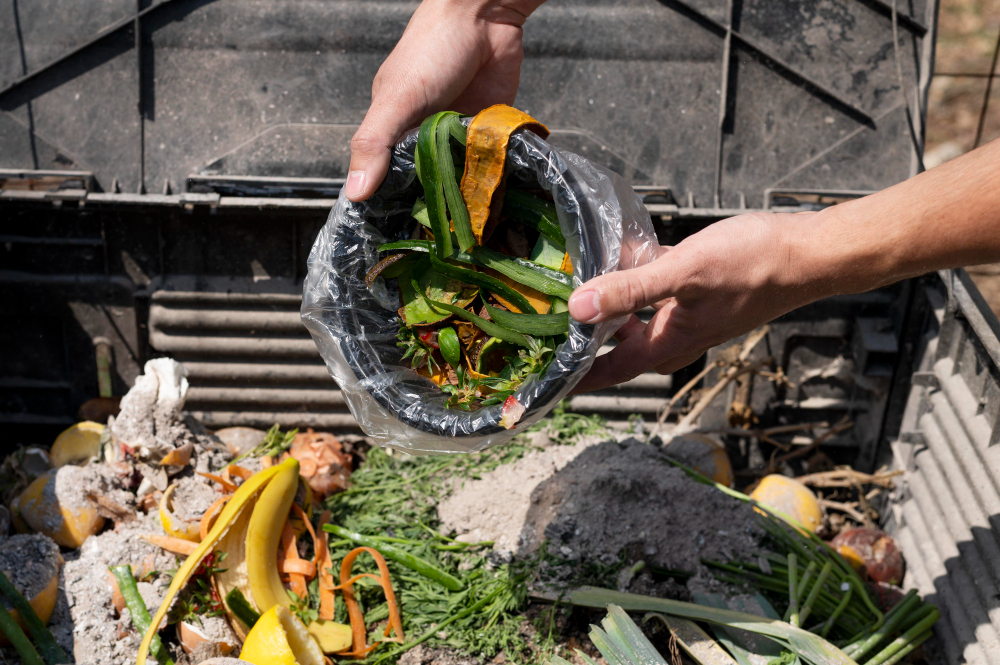This post contains affiliate links. When you buy through our links, we may earn a commission.
Using cooking oil more than once to cook food can not only cut down on costs but can also help the environment. It would mean you’re recycling cooking oil that would otherwise end up in landfills.
To recycle, place it in a glass container and store it in the refrigerator until you need to use it again.
You can find lots of good recipes online that make use of recycled cooking oil and create healthy meals at the same time.
If you have more old oil than you can use, there are several steps you can take to recycle it. We will tell you more below.
Cooking Oil Recycling Preparation
Firstly, you need to wash out a container that you can use. It’s easier to pour your used cooking oil into a clean container than to use one sitting in your refrigerator collecting food particles and odors for months on end.

Also, you can’t separate water from used oil if food particles are floating around. So, washing out an empty container before filling it with old cooking fat is best.
However, it is recommended to use glass containers or bottles instead. It doesn’t matter what kind of container you use as long as it’s not metal. The metal reacts with fats, taints your oil, and potentially produces harmful fumes.
Plastic containers or glass bottles are the best oil containers for storing used cooking oil until you’re ready to dispose of it properly.
Safe And Effective Ways On How To Dispose Of Cooking Oil
Cooking oil should not be poured down your drain or garbage disposal. It can clog pipes and cause sewage backups that are costly and time-consuming to remedy. You have several options to dispose of your old cooking oil, which include:
1. Contact a household hazardous waste disposal company
When it comes to hazardous waste disposal, there are typically two ways an individual can get rid of such items. These include taking them directly to a local hazardous waste disposal facility or contacting a household hazardous waste disposal company.
The first option is easy for some, but not all. For example, suppose you live in a home where different types of toxic substances are used regularly. In that case, you’ll want to contact a household hazardous waste disposal company.
It is because transporting such substances from your home—including old chemicals and flammable liquids like paint thinners isn’t something most people do on their own.
Regarding contacting a hazardous waste disposal company, most companies will come to your home and safely dispose of any hazardous materials you have in your possession.
2. Take used oil to restaurants for correct disposal

Restaurants tend to have large stockpiles of used cooking oil, which can clog pipes and damage the drains. To prevent such damage, many restaurants now use various chemicals to break down solidified oils.
These drains help dissolve fats and proteins left over from your dinner, allowing for safe disposal.
Your local restaurant might not be ready to accept used cooking oil, but don’t let that stop you from asking. If they’re unsure how best to dispose of their oils or want to save on additional expenses, they may welcome your help and expertise.
Check out Allied Waste’s website for more information about recycling at home or around town. You can also call your household hazardous waste collection center to find out what facilities exist in your area.
If there aren’t any, you could always contact restaurants directly; after all, it’ll also benefit them!
Remember to make sure whatever facility you choose accepts both vegetable and animal oils. Do research before dumping your old cooking oil; otherwise, you could cause serious environmental problems. There are also several ways to safely reuse or repurpose old cooking oil instead of simply disposing of it, so continue reading for more information!
3. Use a Grease Disposal System
Everyday household waste items like cooking oil, bleach, and paint can damage local sewer systems and pollute water supplies. Many areas offer drop-off sites for various types of refuse.
If your area doesn’t, you’ll need to find a private service to take these materials off your hands.
You may need to purchase a grease disposal system, or you could rent or lease one from your local provider. It will avoid having an out-of-pocket expense on your end. It’s worth looking into!
4. Add to Compost
Composting is always an option, provided your garden soil can handle it. Cooking oil contains some of the nutrients that plants need to grow. So, composting old cooking oil is almost as good as adding fresh olive or other vegetable oils.

Make sure you don’t add too much, as one gallon per cubic yard of compost works well. If you have a large amount of cooking oil on hand, consider contacting a garden center in your area to donate it to their compost pile.
Many centers accept waste cooking oil and turn it into valuable fertilizer for their customers’ gardens.
In many countries, though, recycling options for cooking oil vary widely by city. If you find an excess of cooking oil on hand and no way to dispose of it properly, here are some more tips listed below.
Simple, Easy Steps for Cooking Oil Disposal
- The first step is ensuring that you have containers on hand so that when you have finished using your oil, it is ready to be disposed of properly. You should also be aware of local ordinances regarding waste disposal and follow them accordingly. It will avoid problems with having too much grease in one place.
- The second step is ensuring that when disposing of your cooking oil, you do not mix it with other waste or food products. It will make things much easier when it’s time to dispose of what may otherwise be a messy substance.
- The third step is making sure any food particles left over after draining out all of the cooking oil are removed before disposing of what remains. That way, when taking care of your waste disposal needs, there won’t be anything else mixed in with your cooking oil.
- Finally, once you have gotten rid of your used cooking oil by following these three easy steps, make sure that you clean up thoroughly.
With these tips in mind, you can help keep hazardous waste from becoming a common household problem by disposing of it properly!
Additional Tips
It’s also possible to use old cooking oil as fuel for barbecues or even set up an outdoor burner designed explicitly for disposing of fats!
The grease will ignite when placed directly over an open flame so long as you keep a close eye on it while it burns off excess liquid. However, this requires extra caution, so be careful.
Frequently Asked Questions (FAQ)
What to do with oil after draining?
Now that you've strained your oil and caught it, you need to store or use it. If you're concerned about using reclaimed grease on food, consider donating it or disposing it responsibly. In general, fats are considered hazardous waste when used in a commercial setting. Most cities will allow residents to compost oils with their yard debris. Just be sure to check with your local recycling center for specifics on what’s okay. Another option is to drop off uneaten—and ideally unsullied—food at a homeless shelter or soup kitchen. Many kitchens will happily accept unused grease and other food items. Look into whether there's an organization in your area that recycles discarded cooking oil for use as biofuel.
How do you dispose of cooking oil drains?
When cooking oil hits your garbage disposal, it can cause severe damage. Cooking grease is loaded with food debris, which causes clogs in drain pipes after partial digestion by bacteria. Drain obstructions caused by foreign objects account for over three-quarters of all plumbing problems. Call an expert plumber at once to avoid costly repairs if you notice any unusual odors coming from your kitchen sink drain. The sooner a problem is identified and fixed, the less expensive it will be to repair.
What do you do with waste kitchen oil?
Waste vegetable or corn oil is easy to turn into compost. Please don't rush to throw it away; you can reuse and repurpose waste kitchen oil instead!
What is the best way to dispose of cooking oil?
There are a few options, including recycling, composting, and draining. For health safety, it is best to dispose of waste cooking oils carefully. Commercial facilities exist for hazardous materials, including cooking oils that can be recycled or composted.Alternatively, you can drain the oil and toss it in the trash, but only if you place the oil in a securely closed glass container first. If you plan on disposing of used cooking oil at home, never pour it down your drain. Instead, use it as natural fertilizer by placing it in pots on your patio or garden beds.
Conclusion
We have discussed several ways to recycle cooking oil, and we hope you have picked one or two methods that will work well for you.
If you have a small amount of used cooking oil, place it in a clean plastic or glass container and refrigerate it for use in soups or to ignite a barbeque.
You can also use it as fertilizer for your plants in your garden or compost. If you have more than you want to keep, remember to call a household hazardous waste disposal company to dispose of it.
Alternatively, you can deliver it to restaurants for safe disposal.
Photo Credits:
Recycling photo created by freepik – www.freepik.com
Empty bottle photo created by bublikhaus – www.freepik.com
